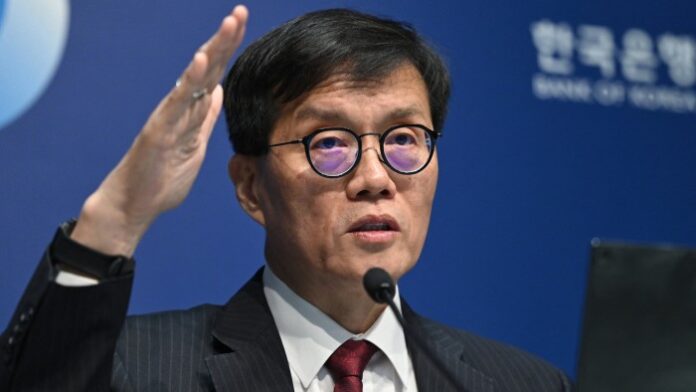Unlock the White House Watch newsletter for free
Your guide to what the 2024 US election means for Washington and the world
The Bank of Korea on Thursday cut interest rates unexpectedly in a rare back-to-back move reflecting concern over the impact of Donald Trump’s second presidency on Asia’s fourth-largest economy.
The BoK lowered the benchmark rate by a quarter-point to 3 per cent amid falling inflation and slowing growth. The move came as the central bank cut this year’s estimated growth rate to 2.2 per cent from 2.4 per cent and next year’s to 1.9 per cent from 2.1 per cent.
“Our decision can be interpreted as an acceleration of easing to deal with downward economic risks that are growing larger than we expected,” BOK governor Rhee Chang-yong told reporters on Thursday.
“Among the biggest changes since August is the ‘red sweep’ in the US, which was bigger than we forecast,” he said, in a reference to Trump’s election victory and Republicans securing control of both houses of Congress this month.
Trump’s threat this week to impose hefty tariffs on its largest trading partners has triggered alarm in export-dependent South Korea, which is set to record its highest trade surplus with the US this year.
It comes at a time of mounting business pessimism in the east Asian country, with 12 out of 17 sectors surveyed by the Federation of Korean Industries reporting a decline in operating profits for the third quarter of the year as companies struggle to contend with a surge in Chinese exports.
Officials in Seoul held an emergency inter-agency meeting on Wednesday to discuss the potential consequences for Korean companies of Trump’s pledge to impose a 25 per cent tariff on all products from Canada and Mexico and an extra 10 per cent on Chinese goods.
Trump described South Korea last month as a “money machine” that should pay $10bn a year for US troops to be stationed on the Korean peninsula. South Korea’s trade surplus with the US was $28.7bn in the first half of 2024, according to the Korea International Trade Association.
This year’s surplus is projected to overtake last year’s record of $44.4bn, raising concerns that South Korea could again be targeted by Trump, who has long railed against countries with which the US has persistent trade deficits.
“Because of the US policy uncertainty, Korean exports and corporate investment are likely to be sluggish, said Kwon Goohoon, senior Asia economist at Goldman Sachs. “Although domestic consumption could improve, the recent weakness in exports will be likely to continue.”
Economists also worry that persistently higher inflation in the US as a result of Trump’s tariffs will increase pressure on the Federal Reserve to tighten monetary policy, further strengthening the dollar against the South Korean won.
“The weaker won will increase the value of Korean imports, increasing inflationary pressure as Korea relies heavily on oil imports,” said Lee Tae-kyu, senior fellow at the Korea Economic Research Institute.
The Bank of Korea would then find it difficult to cut interest rates, he added. “If higher interest rates persist, this will add more pressure on economic growth.”




